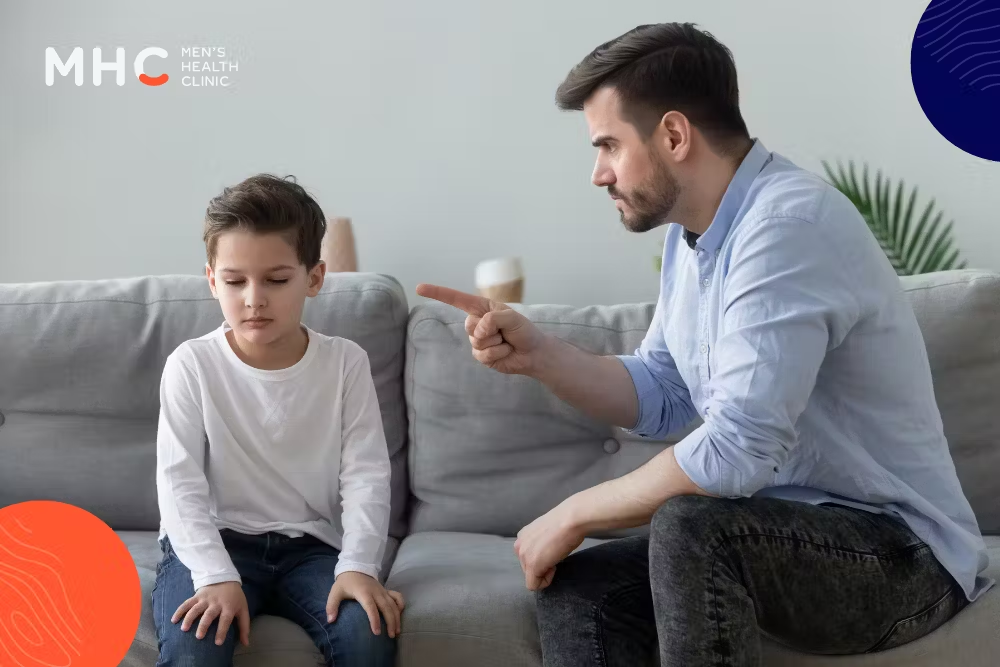As children, we’ve all had those hair-raising, heart-pounding experiences that could make even the bravest kid quiver. For some men, those downright traumatic moments can stick and even shape the adults they become. It’s quite common knowledge that childhood trauma can mess with men’s mental health. But here’s a twist: it can also negatively impact male sexual function. Yes, your trauma from many years ago can affect your bedroom performance.
In this article, we’re looking to promote awareness and pave the way towards healing for men struggling with the long-lasting effects of childhood trauma.
Impact of Childhood Trauma on Men’s Mental Health
There’s a wide range of traumatic experiences during childhood that can have long-lasting consequences. These include:
- Physical abuse
- Emotional abuse
- Sexual abuse
- Neglect
- Witnessing violence
- Living in a household with substance abuse (drugs or alcohol)
According to The 1 in 6 Organization, men who experienced sexual abuse have a significantly higher incidence of mental illness, depression, and underachievement.
The emotional scars left by trauma can manifest in the following:
- Difficulty in regulating emotions
- Negative self-perception
- Low self-esteem
- Trust issues
- Challenges in forming and maintaining healthy relationships
Our childhood experiences generally shape our worldview, belief systems, and coping mechanisms. They influence the decisions we make in adulthood. For instance, people who experienced neglect or abuse in their early years may develop maladaptive coping strategies like substance abuse (or other risky behaviours) just so they can manage emotional pain or stress.
We can connect the impact of childhood trauma to the concept of “attachment theory.” According to this theory from famous British psychologist and psychiatrist John Bowlby, children who experience trauma usually develop insecure attachment styles.
For example, kids who experienced rather unpredictable or inconsistent care may develop an anxious-preoccupied attachment style. They have the tendency to be overly dependent on others for validation because they fear being abandoned. Likewise, they may exhibit clingy behaviours. They usually struggle with setting boundaries, which results in unhealthy relationships.
Similarly, those who experienced severe neglect may develop an avoidant-dismissive attachment style. They learn at a young age to suppress their needs and emotions—becoming self-reliant and avoiding closeness in relationships. As adults, they may struggle with intimacy, suppressing emotions and maintaining emotional distance as a defense mechanism against possible rejections.
Overall, individuals who experienced trauma in childhood and developed insecure attachment styles often face difficulties in forming healthy relationships in their adult years. However, with awareness and support, it’s possible for them to develop more secure attachment patterns.
Impact of Childhood Trauma on Male Sexual Function
Different experiences of childhood trauma can have varied impacts on men’s sex lives.
Physical trauma like traumatic brain injury (TBI) or spinal cord injury (SCI) can lead to various sexual dysfunctions. According to After Trauma, an organisation supported and maintained by the Centre for Trauma Sciences in London, these injuries affect the intricate interplay between body systems (such as the brain and nerves), which are crucial for normal male sexual functioning. If your body systems don’t work properly, you may develop erectile dysfunction (ED), premature ejaculation (PE), and reduced libido.
Childhood sexual abuse is another area of trauma that can leave deep scars extending far into adulthood. The aftermath of sexual abuse leaves a mark on how men perceive and experience intimacy, negatively affecting their sex lives and relationships.
Some men may feel disconnected from their bodies and experience fear or anxiety during sex. This can greatly strain their relationships and worsen existing psychological distress. They may also develop negative self-perception and low self-esteem that can further result in different mental health challenges and sexual dysfunctions (including erectile dysfunction and premature ejaculation).
A notable study from world-renowned sex addiction expert Patrick Carnes says that 78% of individuals in treatment for hypersexuality experienced child sexual abuse.
Hypersexuality sometimes becomes a coping mechanism for men who were sexually abused in their younger years. Engaging in excessive sexual behaviours becomes a way for men to manage the intense emotions and confusion associated with the abuse. Sex addiction can also be a means of temporary relief from anxiety or depression. In some cases, survivors may unconsciously reenact their abuse experiences, seeking control or mastery over the traumatic event.
Substance abuse also often emerges as a consequence of the trauma from being sexually maltreated. Using drugs or other substances excessively can disrupt testosterone production as it leads to either obesity or malnutrition. Low testosterone levels strongly contribute to erectile dysfunction.
The Role of Parents in Adult Behaviour
A child’s psychological development depends on the quality of the parent-child relationship.
When parents provide love and support, they create a solid foundation for their little ones to blossom into emotionally balanced adults. On the flip side, negative or abusive parenting can lead to a higher vulnerability to mental health issues and difficulties in sexual relationships. It’s like planting seeds of either confidence or insecurity in your child.
During the early years of a child’s life (ages 1 to 7), their minds are like sponges. This period is a critical developmental window, where children simply absorb information and experiences from their environment. So, when traumatic events crash the party during this period, they can leave a lasting impact on their adult life.
Ariel Kalil, the Director of the Center for Human Potential and Public Policy at the University of Chicago, emphasises the importance of parents in child development. Kalil argues that the family environment, where children spend the majority of their time, holds huge importance because parents not only provide care for their children. They also make decisions on selecting the environments, neighbourhoods, and schools for their little champs.
Your Childhood Experiences Relate to Your Enneagram Personality
The Enneagram is a personality typing system that dives deep into the connection between our childhood experiences and our unique personality types as adults. The Enneagram categorises individuals into nine distinct types based on their core motivations, fears, and behaviours:
- The Perfectionist — Strives for perfection and values integrity. They tend to be critical of themselves and of other people.
- The Helper — They are motivated by a need to be needed. Usually they put others’ needs before their own.
- The Achiever — Driven by success and recognition, they are ambitious. They are focused on their image and accomplishments.
- The Individualist — They are emotionally sensitive and introspective. Individualists seek authenticity and long for uniqueness.
- The Investigator — Curious and cerebral, they value knowledge and tend to withdraw to observe and analyse the world around them.
- The Loyalist — They are loyal, responsible, and often anxious because they rely on others for reassurance.
- The Enthusiast — Optimistic, spontaneous, and adventurous, they avoid pain and seek pleasure and variety to keep themselves stimulated.
- The Challenger — They value control and power. But they are also assertive and protective, often advocating for justice and challenging authority.
- The Peacemaker — Easygoing and agreeable, they strive for harmony. They hate conflict, so they usually merge with others’ opinions and desires.
According to Enneagram, the challenges and traumas we faced during our formative years shape our default personality. It’s like our way of wearing a suit of armour crafted from our childhood experiences.
Imagine this: if you experienced abandonment or neglect as a child, you might develop a strong drive to seek love and acceptance. Your inner compass points you towards those emotional connections. It’s like your early life experiences shape your desires and motivations in life.
Knowing your Enneagram personality type can offer insights into how your trauma can mould your psychological makeup. There are online resources available to know your Enneagram Personality Type, so don’t hesitate to take free online personality tests. When you’re self-aware, you can face your traumas nose to nose and eventually embark on a path of healing.
Managing Childhood Trauma and Sexual Dysfunction as an Adult
We understand: it’s quite difficult to face our childhood traumas head-on, but the first step to healing is recognition. Acknowledging the presence of trauma and confronting emotions like shame and pain can be painful. But this recognition paves the way for learning healthy strategies to manage the long-lasting effects of trauma (which may include sexual dysfunctions like ED and PE).
Here are some ways to help you manage childhood trauma and sexual health concerns:
Seek Professional Help
Try to reach out to professionals who specialise in both trauma and sexual health, such as therapists or counsellors with expertise in trauma-informed care and sex therapy. They can provide you with tailored guidance and treatments—addressing both your trauma and sexual health concerns. Not ready to disclose information about your childhood trauma? No worries, everyone has their own timing. If you can, just ask a healthcare pro for custom treatments for your ED or PE.
Build a Support System
If you can, inform your trusted family members and friends about your situation so you can offload your worries and anxieties. However, if you don’t want to involve friends and family, you can join relevant support groups. Connecting with individuals who once faced similar challenges can offer a sense of community. Who knows, you can also learn some unique strategies from the senior members to manage your trauma.
Establish a Self-Care Routine
Engage in activities that promote your well-being, including regular exercise, healthy eating, and practising mindfulness to reduce stress. If you are less stressed, you can better think of steps to manage your trauma. Being in a relaxed state also allows you to perform better in bed because stress is a contributing factor to ED and PE.
Communicate with your Partner
Open and honest communication with your sexual partner is always a go-to step to healing. Try to share your worries and boundaries so you can create a safe and consensual sexual environment that respects each person’s needs.
Educate Yourself
Learning about the interplay between your childhood trauma and sexual health can empower you to navigate your life experiences better. Expand your knowledge about childhood trauma by reading books or reputable online resources that provide valuable insights and guidance.
Key Takeaways (FAQs)
What are the effects of childhood trauma on men’s sexual function?
The effects of childhood trauma on men’s sexual health depends on the type of trauma a guy experienced as a kid. Effects may include performance anxiety or reduced libido. In some cases, it can cause difficulties in achieving or maintaining erections and problems with ejaculation.
Can childhood sexual abuse cause sex addiction in men?
Yes, sexual abuse can cause hyper-sexualised behaviours among men. Sexual addiction becomes a coping mechanism for people to avoid anxiety, depression, or shame associated with the abuse.
Can childhood trauma shape an individual’s personality as an adult?
Childhood trauma can indeed influence a person’s attitudes and behaviours in adulthood. This is because during childhood, our minds are like sponges that only absorb information and experiences. Traumatic events during this developmental period can impact a person’s psychological and emotional well-being in the long-term. However, it’s important to keep in mind that the effects of childhood trauma are not irreversible and appropriate support can help you heal.
Unpack the Layers of Childhood Trauma to Address Mental and Sexual Health Issues
Childhood trauma is a rather complex topic that requires heavy unpacking. Recognising your trauma is the first crucial step towards healing. Remember: healing is possible, and no one has to face the effects of childhood trauma alone.
Reach out to us at MHC if you need any assistance. At MHC, we’re all about upholding a comprehensive approach in addressing erectile dysfunction and premature ejaculation. We have mental health experts in the team to guide you through this journey to healing. Answer our questionnaire so we can assess your health profile and you can start a possible treatment ASAP.





